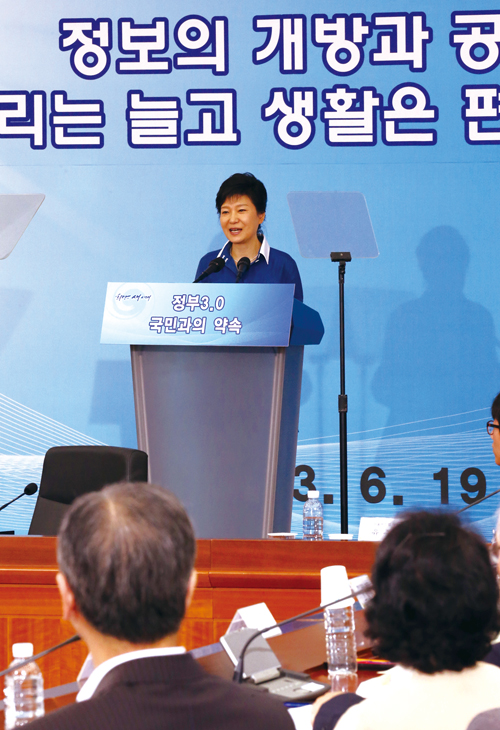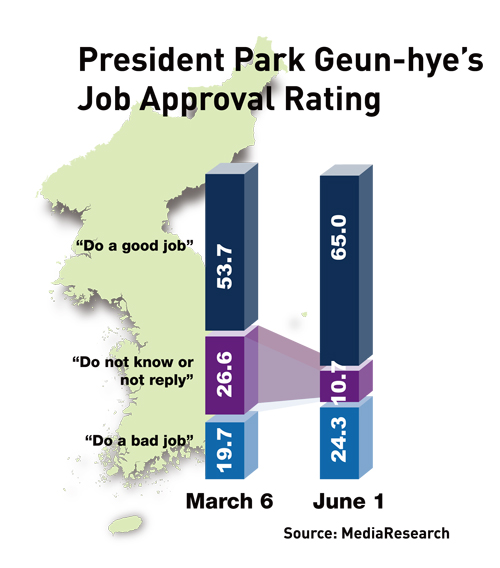Trust-building process on the Korean Peninsula boosts her approval amidst North Korea’s threats and conciliatory gestures

President Park Geun-hye speaks at a ceremony to
declare the Park government’s vision on June 19.
[Photos on courtesy of MCST]

President Park Geun-hye, marking 100 days in office on June 4, has seen her job approval rating rise to 65 percent, up from 53.7 percent on March 6 shortly after her inauguration, a recent opinion poll shows.
A survey conducted by Chosun Media and MediaResearch on June 1 showed that 65.0 percent of the respondents said President Park is doing a good job; 24.3 percent said she is doing a bad job, and the remaining 10.7 percent said they didn’t know or didn’t answer.
As to the question comparing President Park’s job performance between 100 days in office and before her inauguration, the latest opinion poll indicated 64.9 percent gave an affirmative assessment of her job. Of those, 23.2 percent said the president has fared better than thought and 41.7 percent said she has done as good a job as they expected. The remaining 32.1 percent gave a negative assessment of her job. Of those, 19.7 percent said Park did as bad a job as they expected and 11.5 percent said she did worse than they expected.
Asked how they expect living conditions to be in the months to come given her currently handling of state affairs, 42.7 percent said they will likely be similar, 40.2 percent said they will be better off, and 13.9 percent said they will be getting worse. The findings were based on a telephone survey on home or mobile telephones of 1,000 adults over 19 years of age across the nation. The margin of error is ±3.1 percentage points.
But according to the findings, 56 percent replied President Park mishandled personnel management, the sole segment of her job in which the majority disapproved. Some of her picks bowed out due to alleged scandals before and during parliamentary hearings. Former Cheong Wa Dae spokesman Yoon Chang-jung, fired for an alleged sex scandal committed while accompanying President Park on a recent official visit to the United States, was the latest case involving her mishandling of personnel management.
June 4 passed without fanfare for the new administration’s 100 day mark at Cheong Wa Dae. Likewise, a ceremony to declare a vision for creating the so-called creative economy by the Ministry of Science, ICT and Future Planning originally planned for June 31 was cancelled.
There have been some accomplishments in Park’s first 100 days in office, but they have been undermined by a few disreputable things. To name a few achievements, President Park’s first visit to the United States and summit talks with U.S. President Barrack Obama have further strengthened the alliance on the occasion of the 60th anniversary, despite North Korea’s ratcheting up of threats against South Korea and its allies. Some of her campaign pledges have also been translated into action, including the revision of the law on subcontractors, the launch of the Happy Fund for the elderly, relieving of debts of delinquent borrowers who were victims of the 1999 Asian financial crisis and the implementation of a supplementary budget. The government also announced a plan on June 4 to create more than 2.38 million jobs by 2017 through flexible hiring, reduced working hours, job sharing, and more positions for youth, women, and the elderly with the goal of raising the employment rate from 64.2 percent last year to 70 percent.
An opinion poll conducted by the Maeil Economic Daily and MBN on President Park’s 100 days in office, also found that 58.4 percent of the respondents gave an affirmative assessment of Park’s handling of North Korean issues versus 33.3 percent of negative respondents. As to the achievements Park made during her trip to the United States, 65.4 percent responded affirmatively, compared to 25.0 percent giving a negative assessment of them.
Even though it was a time of government transition, fine-tuning major policies and establishing government tasks, the new government has been up and down from the beginning with unexpected challenges and woes popping up.
In particular, North Korea has heightened tensions against South Korea and its allies as the United Nations imposed tough sanctions for carrying out its third nuclear test in February. In April, North Korea suspended the operation of the Gaeseong Industrial Complex, which is a symbol of inter-Korean economic cooperation since its inception 10 years ago.
In a turnabout, North Korea’s Committee for the Peaceful Reunification of Korea offered inter-Korean talks on June 5, saying Pyongyang was willing to discuss the reopening of inter-Korean communications lines and arranging a reunion of displaced families. On the same day, the two Koreas agreed to hold government-to-government talks to take up the reopening of the Gaeseong Industrial Complex and the resuming of a joint tour program to Mt. Geumgang, as South Korea’s Unification Ministry proposed inter-Korean government talks for the first time in 28 months, accepting North Korea’s earlier offer. The Park government has been sticking to the trust-building process since her inauguration, despite North Korea’s war of rhetoric toward the south. But the North abruptly refused to talk with the South and blocked all inter-Korean communication channels on June 12, citing the former's dissatisfaction with the level of chief delegates.
It remains to be seen whether President Park’s trust-building efforts on the Korean Peninsula, her major inter-Korean initiative, will bear fruit in the future.
North Korea’s latest offer might be a desperate step to stave off the stalemate in its relations with China, South Korean analysts say. North Korea’s ties with China, its strongest ally and lifeline, has soured as Pyongyang carried out its 3rd nuclear test, angering China, which in return, later told major Chinese banks to suspend financial dealing with the Foreign Trade Bank of North Korea. Choe Ryong-hae, a close confidante of North Korean leader Kim Jong-un, was dispatched as a special envoy to China last month for the first time since Kim took power in 2011 in a move to restore its strained ties with China. U.S. President Barack Obama and Chinese leader Xi Zinping agreed to denuclearize North Korea during their first summit talks in California on June 9. South Korean President Park’s summit talks with Chinese leader Xi Jinping, in which denuclearization on the Korean Peninsula will figure prominently on the agenda, are slated for late June 27 in Beijing.
Calls for New Government: Dream, Paradigm Shift, Transparency & Integration
Some South Korean notables commented that their assessments of the new government’s first 100 days in office were not bad but not good either. Their suggestions have been summed up: strong challenging spirit, communication, dynamics, and transparency.
Suh Jin-young, emeritus professor at Korea University and an expert on China, said President Park’s diplomatic and security peace initiatives, including the Northeast Asia Peace Initiative and the so-call Trust Process on the Korean Peninsula, should have been further complemented in a more detailed and specific fashion so that a genuine dream of bringing peace, stability, and prosperity on the peninsula could come true. He said, “She will have to bring with her a dream that can be realized more practically when she visits China in late June, and she must continuously dream dreams and materialize them in realistic terms with hope.”
Lee Pil-sang, a former professor at Korea University, called for a shift in the economic paradigm, changing to a dynamic one, departing from her static leadership. “Now is the time when Korea will have to change its economic management paradigm. If it tries to ensure stability and change, but not break of the existing mould, no tremendous changes can be made,” he said. Lee warned that the new government’s economic policies, dubbed ‘priming water,’ could be insignificant if the pump is out of order, saying that it has to provide a refreshing shock so that people can sense a shift in the economic paradigm.
Kim Hong-shin, a millionaire best selling novelist and ex-lawmaker, said Cheong Wa Dae should be reborn as a transparent organization that can be seen from the outside and the inside like the West Wing of the American White House. He went on to say that an open working environment could lead to communications with people and prevent unfortunate things like the belated reporting of the sex scandal involving the former presidential spokesman.
Chun Sung-chul, chairman and CEO of IGM, said, “The new government’s philosophy on the creative economy is the first precondition for solving all policies and conflicts through win-win strategies.” Commenting on President Park’s buzzwords for building the creative economy, Chun said it is possible to realize the creative economy when creative methods are utilized. The creative economy itself means creating new things by exposing what all things are and combing them, even though the concept seems ambiguous to people due to a lack of materialization. He also called for lending its ear to all voices within political circles and reconciling with them to translate them into action after finding out people’s genuine needs.
